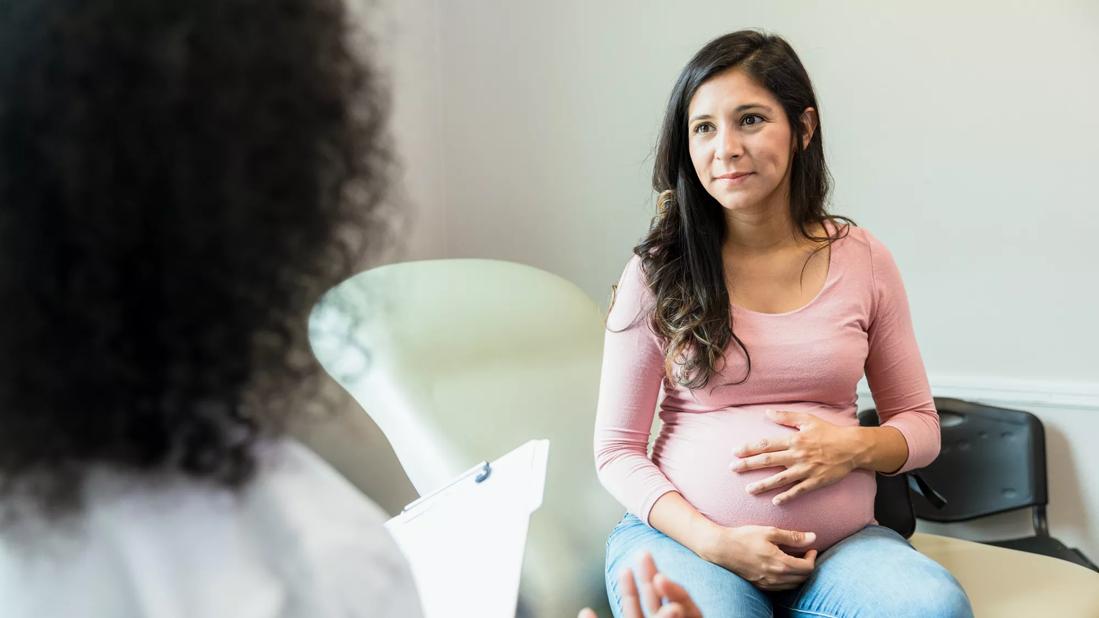Pregnancy did not appear to increase the risk of recurrence in patients or complications in their children

Image content: This image is available to view online.
View image online (https://assets.clevelandclinic.org/transform/8ccb6051-96a9-41a2-8d9b-623b3eadad30/pregnant-woman-doctor-visit-1340094841)
Pregnant woman with doctor
In a study of 4,732 patients with young-onset breast cancer who carry a BRCA mutation, roughly 22% percent became pregnant after treatment. The study found pregnancy did not negatively impact the mother’s risk of further cancer or result in higher complications in their children. The findings, which were published in JAMA, also found that despite having fairly aggressive treatment regimens, many women with young onset BRCA1/BRCA2 breast cancer conceived naturally.
Advertisement
Cleveland Clinic is a non-profit academic medical center. Advertising on our site helps support our mission. We do not endorse non-Cleveland Clinic products or services. Policy
Although there is considerable information emerging about the safety of pregnancy after a breast cancer diagnosis, little has been known about the impact of pregnancy safety for those with a BRCA1 or BRCA2 mutation. Those patients have a unique set of challenges to contend with. Those with a genetic disposition for breast cancer are at higher risk of new breast cancer events in their lifetime, as well as risks of other types of malignancy such as ovarian cancer. There is also some evidence that fertility may be impaired at baseline for women with a BRCA mutation.
Researchers were looking to better understand this population of young breast cancer survivors and the risk and likelihood of pregnancy.
The study included an international cohort of women under age 40 who carried BRCA1 or BRCA2 gene pathogenic variants and were diagnosed with invasive breast cancer between January 2000 and December 2020. Data was gathered from electronic medical records at 78 medical centers around the world. The primary objective of the study was to determine the incidence of pregnancy after breast cancer, as well as its prognostic effect on BRCA carriers.
“We wanted to understand how often pregnancy occurred in this cohort, as well as the outcomes of pregnancies both for the patients and their children,” says Halle Moore, MD, Director of Breast Cancer Oncology at Cleveland Clinic Cancer Institute.
4,732 patients were eligible for the trial. The average age at diagnosis was 35. The majority of patients underwent breast-conserving surgery or mastectomy, as well as chemotherapy and endocrine therapy.
Advertisement
Of the 4,732 patients in the study, 659 had at least one pregnancy after breast cancer. Among those, 79.7% completed the pregnancy to term. Of those 517 patients, 406 had single births and 54 had twins. 0.9% of the infants had congenital abnormalities. There was no notable difference in recurrence and/or disease-free survival among patients with or without pregnancy. The percentage of infants with congenital abnormalities was in line with the general population.
“I think it’s very reassuring for patients to know that pregnancy is quite possible following treatment for early-onset, BRCA-associated breast cancer,” says Dr. Moore. “Interestingly, most patients became pregnant naturally in spite of having aggressive treatment, including chemotherapy.”
BRCA carriers still face many issues in planning their families. Their children have roughly a 50% chance of inheriting this genetic predisposition. Due to this concern, patients considering in vitro fertilization have the option of genetic testing prior to implantation.
Another challenge with family planning is how to do so safely while mitigating future cancer risk. Many patients with the BRCA mutation are advised to have an oophorectomy to mitigate the risk of ovarian cancer. However, in some cases, removal of the ovaries can wait until after they have completed their family. In other cases, reproductive endocrinologists may be able to help the patient support a pregnancy hormonally (without ovaries present). Other patients may choose to store their eggs or use medications to protect ovarian function during treatment.
Advertisement
“Our hope is that this study will empower physicians to discuss fertility with their young patients facing breast cancer prior to the start of treatment, so they understand the risks and benefits, as well as any steps that can be taken to mitigate risks upfront,” says Dr. Moore. “The more we can support patients early on, the more opportunities they have down the road.”
Advertisement
Advertisement
Phase 1 study demonstrates immune response in three quarters of patients with triple-negative breast cancer
Reconsidering axillary lymph node dissection as well as depth of surgical margins
Ultra-Hypofractionated Whole Breast Irradiation and Partial Breast Irradiation Reduce Many Toxicities
Best practices for reducing toxicities
Partnerships with local social service agencies key to program success
Ongoing clinical validation refine breast cancer risk substratification
Phase 3 trial found no survival differences between weekly or biweekly doxorubicin/cyclophosphamide or between weekly or biweekly paclitaxel
Findings strengthen evidence for risk-reducing procedures